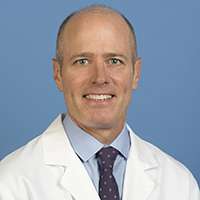Chair's Welcome
Welcome to the Department of Neurology at the David School of Medicine at UCLA

Our mission states that we are dedicated to preventing, curing and improving the lives of people with neurological diseases through patient care, research and education. Translating this general Mission into action means that our underlying mission is to innovate. We approach research, clinical care and education with a view toward innovation and change. What can we do to move forward? How can we create new and novel programs that will define the future of neurology?
Here are a few examples:
- In education, innovation means that we have developed a Clinician Educator Track in our Neurology Residency. This track combines didactic training in the Medical Education Fellowship at the School of Medicine with experience in giving neuroscience and clinical education with selected lectures and seminars for the UCLA undergraduates, graduate students, within the Neurology Residency and to allied health professionals. This pairs with the Neurology Residency R25 research track to offer specialized neurology education programs, and to innovate within the residency.
- In research, we have developed the Clinical Neurogenomics Research Center (CNRC). The CNRC is sequencing the DNA of all of our outpatients, and pairs this with a bioinformatics analysis pipeline. The result is a database that allows clinicians to test hypotheses about neurological disease, treatment responses and outcomes without having to be genetics experts. The CNRC is led by Brent Fogel, MD, PhD, with co-director Noah Zaitlen and starts from excellence, building one of the best neurogenetics programs in the country, with Dr. Fogel and Dan Geschwind, MD, PhD.
- In clinical care, we are developing an innovative community neurology and subspecialty neurology care network within UCLA Health, with a hub and spoke model of general neurology care and more specialized care that combines traditional strengths in academic medicine with the advantages of localized and routine community neurology.
Neurology as the future
America enters a pregnant moment in medical care and disease treatment. As our population ages and the era of molecular medicine delivers greater cures and increased life expectancy, human disease is re-born as a problem with the brain as its limiting factor. Alzheimer’s and Parkinson’s diseases, stroke, neuropathies and brain cancer are all age-related diseases. Multiple sclerosis, epilepsy and sleep disorders are neurological illnesses with an age component. Clinical care in neurology embraces the challenges of maintaining brain function in aging, preventing cognitive decline and treating these neurological conditions. One might argue that if heart disease or cancer is successfully treated, but a longer life produces a functionally degraded or demented state, what is the use of this longevity?
With the aging U.S. population and disease treatment successes, neurology has emerged as the medical specialty with the future imperative. UCLA Neurology will lead the way into this future with innovative research into nervous system function and disease, advanced patient care for neurological illness and education of the future leaders in clinical care and neurological research. The past is an indicator of success in UCLA in this vision and the future is bringing new research and clinical programs to enlarge and strengthen our efforts to cure neurological disease.
UCLA Neurology poised to lead the way
UCLA Neurology is a robust department with extensive research, clinical and educational programs strategically positioned to lead into the future. UCLA Neurology is a large and deep department with 109 full-time faculty. In research activity, we have been in the top 10 in neurology departmental NIH funding since the early 1990s. Research output from the department places it in the top 5 in the field in terms of publication numbers, citations and specific citation metrics (such as H index).
On the clinical side, UCLA Neurology has inpatient services in the state-of-the-art Ronald Reagan UCLA Medical Center. The neuro ICU is a large 26-bed unit with 3 Tesla MRI and PET-CT scanners. Adjacent stroke, general neurology and epilepsy services occupy spacious floors which, like the hospital in general, have the openness and natural light that was part of the original design by I.M Pei.
Together with the neighboring outpatient Neurology Clinic, a strong focus on quality of medical care places UCLA Health as #1 in Los Angeles and #8 in the nation. UCLA Neurology extends beyond the Westwood Campus to include the West Los Angeles and Sepulveda Veterans Administration Medical Centers and the Los Angeles County Olive-View UCLA Medical Center. Overall, this clinical UCLA Neurology network provides clinical care, research and educational opportunities to one of the most ethnically, economically and socially diverse patient populations in the country.
On the educational side, UCLA Neurology education has matching focus in size and quality. We have recently extended our medical student clerkship. There are more than 125 neurology trainees as graduate students, post-doctoral fellows and clinical fellows, a highly ranked residency program and unique educational channels, such as the UCLA Neurology Resident NINDS R25 research program that funds a dedicated clinical or basic science research track in the residency.
In addition to the traditional mission areas of clinical care, research and education, our department is committed to a fourth priority around culture. We are dedicated to making our department a place people want to work -- where they feel valued, respected and heard. Our faculty and staff lead departmental committees and programs around a variety of important aspects of culture including mentorship, diversity, collaboration, and women in neurology.
We've articulated our goals around these four priorities in our departmental strategic plan. This strategic plan guides us to reach our ultimate goal to be the leader in patient care, teaching and research for neurological disorders.